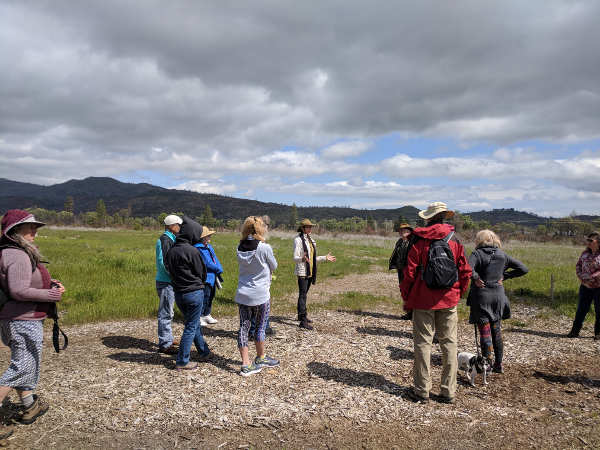- Elizabeth Larson
- Posted On
Lakeport City Council gets update on proposed annexation, approves funds for fiscal analysis
LAKEPORT, Calif. – The Lakeport City Council voted unanimously on Tuesday night to approve a budget adjustment to pay for a fiscal analysis that’s a key part of moving forward with the proposed annexation of the South Main Street corridor.
The corridor – the most lucrative commercial area in county jurisdiction – has been in the city’s sphere of influence since at least the 1980s, and the city’s more recent attempts to move toward annexing it has led to clashes with the county, which has been loath to part with the area for financial reasons.
The county remains unwilling to give up the corridor, according to county Supervisor Tina Scott, and based on Tuesday’s meeting it appears that the city and county are headed into another struggle over the area, with officials on both sides giving divergent versions of previous negotiation attempts.
Lakeport Community Development Director Kevin Ingram said one of the council’s stated goals is the completion of the annexation this year.
In addition to giving an overall update on the annexation plans on Tuesday night, Ingram said staff also was asking for a $17,980 budget adjustment to do the fiscal analysis.
He said the proposed annexation area is 125 acres south of the city limits, consisting of 52 parcels.
In 2016, the Lake Local Area Formation Commission, or LAFCo, the agency responsible for the review and approval of spheres of influence and annexations within Lake County, reviewed and approved the city’s sphere of influence, he said.
“It would be an understatement to say that this annexation is controversial,” said Ingram.
He said the city has attempted to meet with the county regarding the matter, but the county has said they are not interested. The county also has threatened to cancel encroachments in the area and asked LAFCo to remove the area from the city’s sphere of influence in 2016, according to Ingram.
The importance of moving forward is due to needing to provide public drinking water, fire prevention through hydrants and water laterals, and other water infrastructure because a large road widening project is slated to constructed in the area in 2021 and that water system work needs to be done ahead of, or in concert with, the road project, he said.
Ingram said there also have been several notices of violation by the California Department of Water Resources for water systems in the area due to inadequate infrastructure or poor water quality. Some of those properties have been told that they need to hook into a public water system or make serious improvements.
He said staff has been working diligently on the LAFCo application, which they intend to submit this spring.
The LAFCo submission includes the application, statement of justification, plan of services, legal description, property tax sharing agreement between city and county, California Environmental Quality Act environmental documentation and a resolution of application from the city council, according to Ingram’s written report. Due to the history and controversy associated with the matter, the LAFCo executive director recommended the city conduct a fiscal analysis that looks at the annexation’s impact on both the county and city.
Ingram said the controversy over a tax sharing agreement between the city and county has been a problem.
He said the city plans to move forward with agreements established with the county in 2001 and 2002, in which the city agreed not to annex the South Main Street area for a period of 10 years unless it entered into a new revenue sharing agreement for property tax.
Ingram gave a brief outline of the steps involved in the annexation process, including the council passing a resolution of application and filing the application with LAFCo; the LAFCo executive officer reviewing the city’s application documents and the resolutions effecting the property tax exchange and, if all is in order, issuing a certificate of filing and providing written notice to all affected local agencies; Lake LAFCo conducting the first public hearing and adopting a resolution making determinations either approving, denying or modifying the annexation proposal, and if the application is approved, LAFCo will establish the date for the second public hearing also called the “protest hearing.”
During the protest hearing, written and oral testimony is received. Ingram’s report said that, depending on the number of written protests received from registered voters and landowners, the commission orders the annexation, orders the annexation subject to an election or terminates the annexation.
Should LAFCo order the annexation, the executive officer issues a certificate of completion after receipt and review of the required documents, records the certificate with the county recorder, and files a statement of boundary change with the State Board of Equalization.
Supervisor, business owners speak against annexation
During public comment, Supervisor Scott told the council, “I inherited this situation.”
Scott offered a different version of events than Ingram’s. “The county did sit down with the city many times.”
She said they thought they had a tax sharing agreement, but when she and County Administrative Officer Carol Huchingson returned later for a followup meeting, she said Councilwoman Stacey Mattina explained what the city was offering, and Scott said it wasn’t what they had agreed to previously.
“The county is in no position to give up any tax revenue,” said Scott.
She said she had many phone calls from people demanding that she go to city hall and fight for them. “They have no interest in being annexed with the city.”
Scott said the county has been working diligently to figure out a proper water source for South Main Street in order to get the pipes in the ground before the road project. She said they have some money set aside and also have submitted an application to the US Department of Agriculture.
“We have every intention to bring water to South Main,” said Scott.
Scott added that they had many property owners there who wanted to speak.
In all, five people spoke; two of them asked questions about the process, two property owners spoke against it and another man who doesn’t live in the annexation area but worked for the county said he didn’t support it.
Suzanne Lyons, LAFCo’s alternate public representative, said it gets very confusing when they’re talking about tax sharing.
“It's a big project that’s being taken on down there,” she said. She added that the cost benefits to the different agencies aren’t clear, and she questioned if anyone actually had done the short- and long-term analysis.
City Manager Margaret Silveira said that’s what was on the agenda, working with a consultant to conduct that fiscal analysis.
Lyons said she had been waiting for that a long time, then returned to her seat in the audience and said, “There’s no meat on the bone.” To which Scott, sitting near her, replied, “There’s meat, that’s why they want it.”
Business owners Paul Breunig and Ron Rose said they were against the annexation, and Rose said the property owners would go to former Supervisor Anthony Farrington – who had been meeting with property owners to rally against the annexation – and have him file a class action lawsuit on their behalf.
John DelSignore, a retired county well expert, said the annexation “has been an ongoing problem,” and said he’s opposed to it, calling it a money grab. DelSignore does not live in the annexation area.
Council members defend city plans
Councilman Kenny Parlet said Farrington previously was responsible for an extremely aggressive campaign to give a one-sided depiction of what was going on with the annexation. “He's the go-to guy if you're against annexation.”
Parlet said the city now has a necessity and obligation to grow, noting the sphere of influence and the water problems.
“The county, they love it the way it is,” he said, accusing the county of taking the money from the corridor’s tax base and doing nothing with it for that area, while the city has plans to improve the water line. “I don't think today is the time we talk about that because we've kind of been hornswoggled.”
He disputed Scott’s portrayal of the city and county having many meetings. He said there were maybe two, and by the third meeting – which city officials later clarified happened last year – county officials refused to discuss the matter further after Mattina told the county what the city was offering.
“We were prepared to do whatever was necessary to get this done,” said Parlet, who explained that Supervisor Rob Brown told the city at that final meeting that the county was done talking about the matter.
“They're worried about losing their revenue, that's all they cared about,” Parlet said, adding that the city had been willing to offer the county much of the property tax income.
“There's two sides, and you've only been given one side,” he said.
He said it’s an extremely complicated issue, but he maintained that citizens would see more benefits if they were in city jurisdiction. “This will be our town and we will take care of it better than the county ever did.”
Councilwoman Mireya Turner said the council will have plenty of opportunities in the future to discuss the benefits of annexation, but that what was before them on Tuesday night was the opportunity to gain more solid data to help them and the public in moving forward.
“It's unfortunate how much misinformation is still out there. It's mind-boggling,” said Mattina.
Mayor Tim Barnes asked if the fiscal analysis would be a comprehensive study on the financial consequences for the city and county. Silveira said yes.
Mattina moved to approve the budget adjustment for the fiscal analysis, with Parlet seconding and the council approving it 4-0. Councilman George Spurr was absent for the meeting.
Following the vote – which occurred about two-thirds of the way through the meeting – Scott, who usually remains throughout the council meetings she attends, left the chambers along with the others who had come to speak against the annexation and didn’t return.
Supervisor Brown explains his role in negotiations
Lake County News later contacted Supervisor Brown to ask him about the statements made about city-county negotiations.
Brown denied calling off the negotiations, as Parlet had claimed, and said that last year when they went to discuss the matter, it was the city who said they wouldn’t negotiate as they already had an agreement that would allow them to move forward. That agreement is likely one of those from 2001 or 2002 mentioned by city staff at the meeting.
“Whatever the agreement was in 2001 really doesn’t make any difference now,” said Brown.
He said at that last meeting involving city and county officials last year, Mattina and Parlet were present, and by that time the county “had already agreed on what it was that we needed and we couldn’t take anything less.”
Brown added, “They weren’t willing to negotiate so I asked if we can hold off until we did a little more research as to what it was we could, or would be willing to do.”
He said at one point city officials told the county that they could sue them over the annexation, which he said he told them changed the situation.
He said Special Districts Administrator Jan Coppinger is working on designing a system for the area and, like Scott, he related that Coppinger is working on grant funding through the USDA, which was slowed by the shutdown.
Brown said the city taking over the area would be a “big loss” of much-needed revenue for the county, which is already facing major fiscal challenges.
Email Elizabeth Larson at elarson@lakeconews.com. Follow her on Twitter, @ERLarson, or Lake County News, @LakeCoNews.
020519 Lakeport City Counci... by on Scribd

















